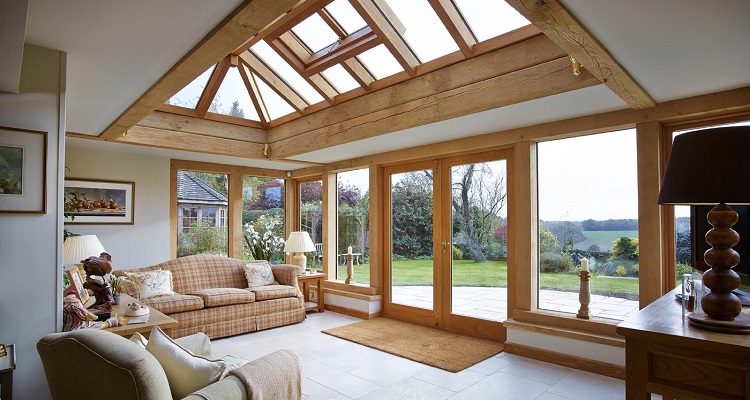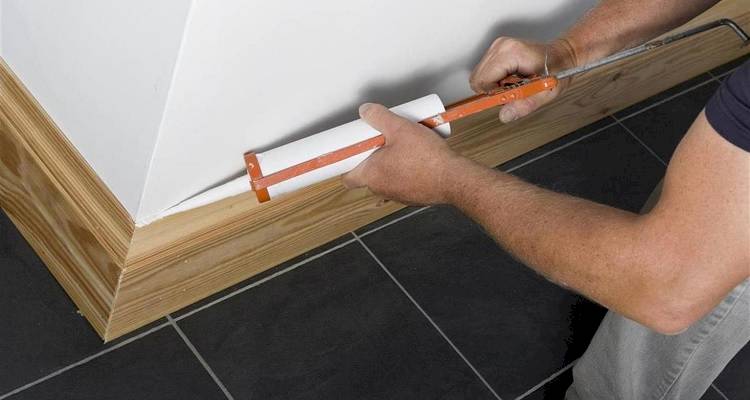Repointing Patio Cost
- The average cost of repointing a patio is between £15 and £25 per square metre, plus £150 to £250 per day in labour fees
- Depending on the job's complexity, it usually takes 1 to 3 days for a small patio and 3 to 7 days for a larger patio.
- A pricing breakdown for different types of gas fire and scope of work
- How long does gas fire removal take, and what the job entails
- How do you find a certified gas engineer to carry out the removal safely?
If your garden’s patio has crumbling mortar joints and has generally seen better days, it might be time to consider having it repointed. Repointing is a remedial process that involves replacing or repairing old and worn mortar joints between patio slabs to restore their appearance and stability after years of use.
Repointing is an important maintenance requirement. It helps prevent weed growth between garden slabs, improves rainwater drainage, and extends the lifespan of your patio.
You can expect to pay around £20 per m2, but this can vary due to a couple of factors.
If you'd like to get a quote from a local bricklayer to repoint your patio, we can help you with that too!
So, what’s the average cost of repointing a patio, and is it something you can fix yourself as a DIY project? Keep reading to find out everything you need to know.
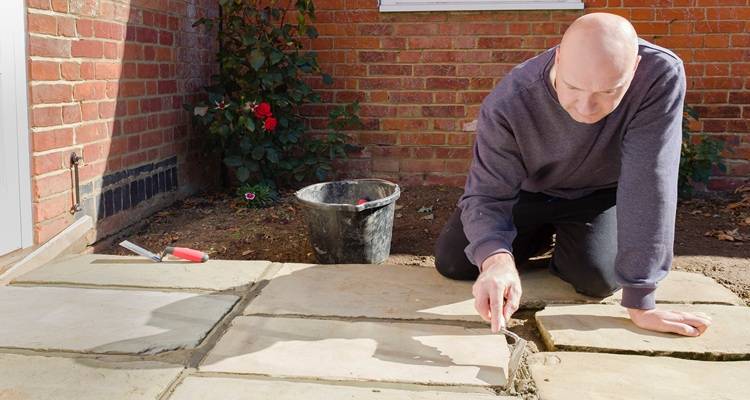
£20 psm
Table of Contents
- How Much Does Repointing a Patio Cost?
- Cost Factors for Repointing a Patio
- Building Regulations Related to Patio Repointing
- Types of Pointing Materials for Patios
- Alternative Patio Maintenance Options
- Hiring Contractors Checklist for Repointing a Patio
- Removing Old Pointing: Considerations and Costs
- FAQs
- Sources
How Much Does Repointing a Patio Cost?
The cost of repointing a patio generally costs between £15 and £25 per square metre, averaging at £20 per square metre for most patio repointing mixes. On top of the supply rate, you’ll also need to pay for your labourer’s time, costing between £150 to £250 per day, depending on their skill and experience level.
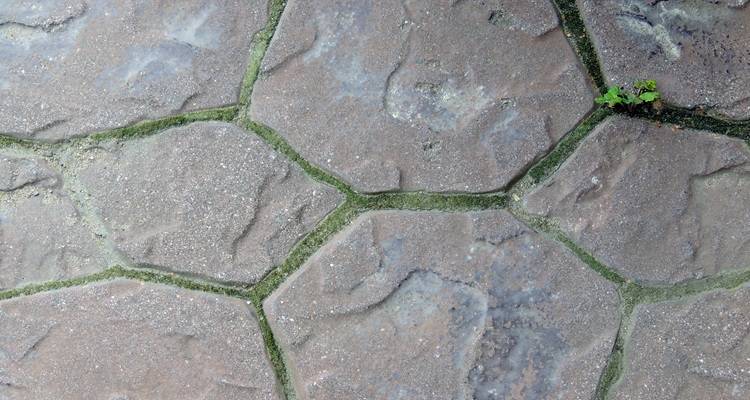
While these figures act as ballparks, actual costs will depend on the size of your patio, the material used for pointing, and local/geographical differences in labour fees.
As you’d expect, the more intricate and complex the pointing pattern, or the more damaged your original mortar is, the higher your costs will be as the project will take longer to complete.
Repointing Patio Prices
Let’s take a closer look at patio repointing costs, considering a range of scenarios:
| Activity | Total Estimated Cost |
|---|---|
| Repointing basic patio with minimal damage | £15 per square metre |
| Repointing basic patio with moderate damage | £20 per square metre |
| Repointing basic patio with extensive damage | £25 per square metre |
| Labour costs (per contractor) | £150 to £250 per day |
Repointing a basic patio with minimal existing damage will cost around £15 per square metre, while repointing a patio of the same style and layout with moderate damage will cost slightly more, at £20 per square metre.
You will likely pay closer to £25 per square metre for patios with extensive damage or more intricate designs. On top of these fees, you’ll also need to budget for labour costs, ranging from £150 to £250 per day, depending on the skill of your contractor.
Supply Costs for Repointing a Patio
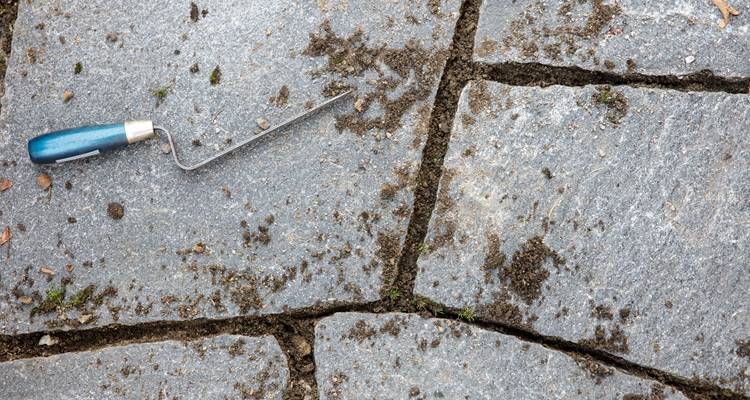
You’ll need the following supplies to repoint your patio:
| Item | Cost |
|---|---|
| Resin-based patio pointing mix | £65.99 per tub |
| Traditional mortar patio pointing mix | £31.99 per tub |
| Chisel to remove old mortar, using a hammer and bolster to loosen stubborn areas | £30 for a kit |
| Stiff-bristled brush to sweep away the debris from the area | £3.99 |
| Pointing trowel to apply new mortar | £5.99 |
| Hosepipe/water supply | £11.95 |
Your supply costs will differ depending on your pointing mix. Resin-based products are more expensive (while offering longer-lasting results), while traditional mortar mixes are cheap.
Additional Costs for Repointing a Patio
While repointing patio slabs might be your end goal, you’ll need to ensure your patio is prepped for the work beforehand. This will include:
Prep Work
Clearing old joints, ensuring old mortar is removed, levelling slabs where needed, cleaning the surface. Garden maintenance costs between £14 and £25 per hour if you want help with this task.
Levelling
If your patio repointing is part of a larger garden project, consider garden levelling if you have some uneven surfaces. This can cost between £1,000 to £2,000 for a small, moderately uneven garden.
Waste Disposal
Old mortar and debris must be disposed of responsibly, and removing the material beforehand can trim down your project costs. Garden waste disposal is charged by volume and contents, with hazardous materials costing more. Depending on your needs, the fees range between £15 and £400.
Sealant Application
Once the repointing has happened, this is an optional step. Applying a sealant can help weatherproof your patio, but it will cost extra. Sealants start at around £35 per tub.
Weed Treatment
Repointing your patio will help ward off weed growth, but you can amplify this protection by ensuring all weeds and remnants are removed prior to the repointing process, helping to ensure the longevity of your work. If you have stubborn weeds like Japanese knotweed, your expenses can run into the high thousands.
Labour Costs and Timescales for Repointing a Patio
Timescales for patio repointing will depend entirely on the size of your patio, its condition, and any accessibility barriers. Typically, repointing labour costs will be around £150 to £250 per day, with the highest charges coming from contractors with the most experience or those tasked with working on intricate and highly damaged pointing.
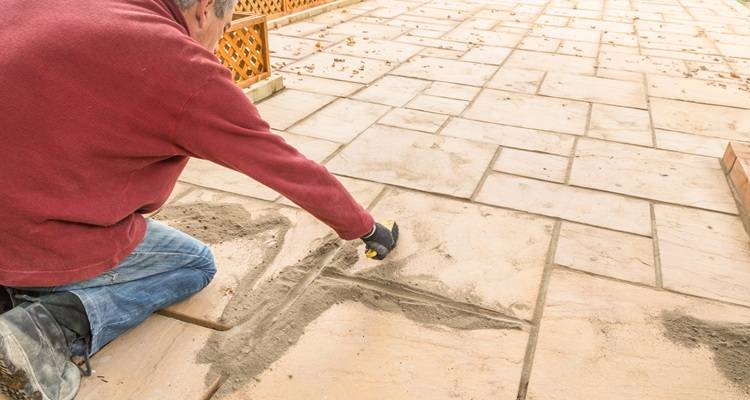
For a small patio, the work will take 1 to 3 days to complete and cost between £150 and £750 in labour fees.
Larger patios can take 3 days to a week to complete, with an estimated labour charge of £450 to £1,750. Complex patterns or significant preparation work may extend these timeframes, so if you’re looking to reduce your outgoings, it’s worth trying your hand at some of the preparation work to trim down the time you need contractors on-site.
Cost Factors for Repointing a Patio
Let’s take a closer look at some of the reasons your patio repointing project’s budget can fluctuate:
Patio Size
The larger the patio, the more materials you’ll need–as well as more bodies in labour. As with all home renovation jobs, the larger and more extensive the area needing work, the higher your charges will be.
Joint Width and Depth
While this might not be something you immediately consider to impact your project’s cost, wider joints need more material to fill, increasing your supply costs.
Pointing Material
Resin-based compounds cost more than traditional mortar. If you’re having your patio repointed using the former, be aware of the higher costs of this material versus traditional mortar, which is cheaper by comparison.
Patio Condition
The more damaged your patio is, the longer it’ll take to repair, replace and remove affected areas. This will bump up your labour costs, as well as any associated costs related to waste removal/collection or garden clearance.
Building Regulations Related to Patio Repointing
Unlike some other home renovation projects, patio repointing generally doesn’t require planning permission or building regulations. However, if you’re planning on making any major changes to the patio's structure or drainage, you may need to comply with local guidelines.
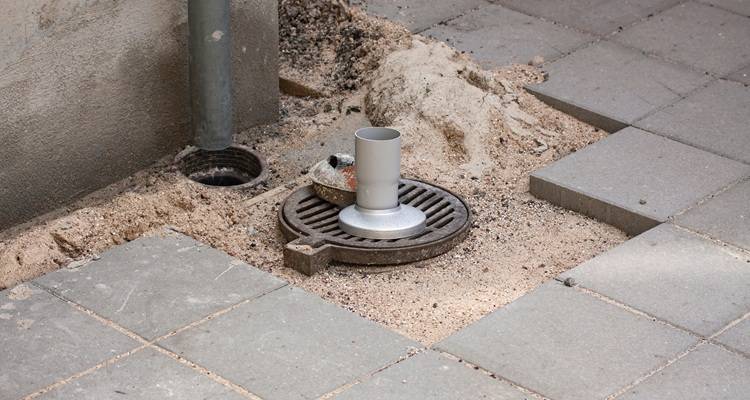
If you’re in doubt about what is and isn’t permitted, your patio contractor can advise you on what’s best. Drainage is essential for garden spaces to ensure proper rainwater runoff and prevent groundwater flooding, so it’s important to get this step right if you plan on making any major changes to the existing layout or structure of your patio and surrounding area.
Types of Pointing Materials for Patios
Several different types of pointing materials are suitable for patios, giving you plenty of options when it comes to installation.
Traditional Mortar
Traditional mortar is the most common material associated with patio repointing. It is cost-effective and widely used, though it may crack over time.
| Type of Pointing Material | Advantages | Disadvantages |
|---|---|---|
| Traditional mortar | Cheap to acquire | Not as long-lasting as resin-based materials |
| Natural finish, being customisable in colours | Not suitable for flexible construction as it will crack away |
Resin-Based Compounds
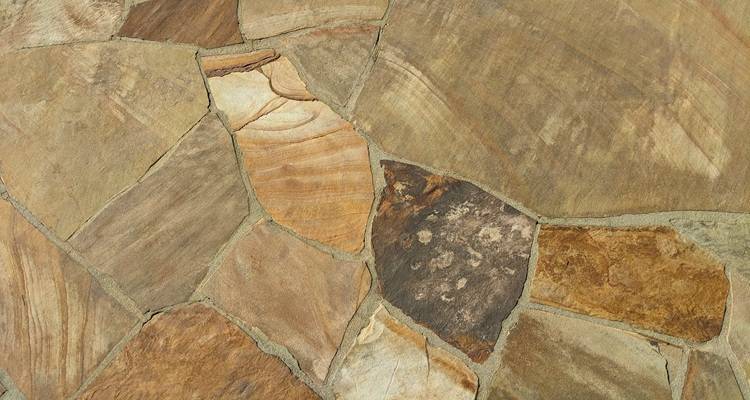
Resin-based compounds are growing in popularity owing to their durability and weed-resistant properties. Because of these advantages, the material is far more expensive than traditional mortar repointing mixes.
| Type of Pointing Material | Advantages | Disadvantages |
|---|---|---|
| Resin-based compounds | Quick to use, reducing labour time and costs | More expensive than traditional mortar |
| Hard-wearing, long-lasting material | Short window of application | |
| Resistant to frost | It needs to be applied with precision |
Dry Jointing Mixes (sand and cement)
These are quick to apply and are great for smaller patios or temporary fixes. However, they’re not the best for larger areas and shouldn’t be used for full replacements as they won’t be as long-lasting or cost-effective as other materials.
| Type of Pointing Material | Advantages | Disadvantages |
|---|---|---|
| Sand and cement | Cost-effective, easy to find and purchase | Can crack over time |
| Durable, long-lasting results when applied correctly | It needs dry weather for proper application | |
| Customisable in colour | Labour-intensive, taking a longer time to apply than other compounds |
Alternative Patio Maintenance Options
If your patio has seen better days but you don’t necessarily want to bother repointing it, you can opt for alternative maintenance methods to keep the area clean and tidy.
Pressure washing can be a good solution to remove built-up dirt and grime from your patio. However, you need to ensure your patio is suitable for pressure washing, as the action can cause more harm than good if you use too much pressure or the wrong technique while cleaning.
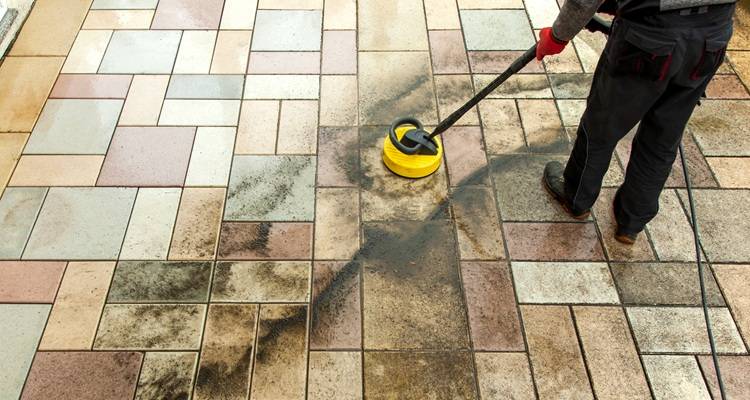
Sealing your patio is a great option for those wanting to ensure longevity with minimal effort and interference over the years. Coloured sealants are available for those wanting to change the aesthetic of their patio without the effort of changing the slabs, while invisible sealants are great for those wanting to protect their patio without altering the appearance.
If you have a block-paving patio, you can choose to re-sand the surface to restore it to its previous appearance when it was first laid. While this can obviously impact your patio's aesthetic, resanding block paving can also help ensure its longevity as part of ongoing maintenance.
The action helps to bind the block paving together, stopping them from moving so much underfoot as the years go by. Weeds will also be kept at bay as a result, as any gaps will be filled in, preventing weed growth and sprouting.
Hiring Contractors Checklist for Repointing a Patio
When hiring any contractor to work on your home, you want to ensure they’re up to the job and, crucially, will do a good job on whatever project you’re hiring them for.
- It’s essential to check your patio repointing contractor’s credentials before agreeing to work with them, including their experience, customer testimonials, photos or videos of previous jobs, and information about any warranties or insurance they hold on their work.
- Take a look at their experience: Is it suitable for the job you have in mind? Are they versed in using mortar-based materials or resin compounds? Does their speciality line up with what you want?
- Be sure to look at their customer testimonials and reviews from past jobs and any photos or videos of their work to get an idea of their finish and standard. Pay attention to any reviews citing bad workmanship, messiness, bad timekeeping, or communication, as these can be early red flags that can help to ward you away from working with a rogue trader.
- Make sure you request a detailed quote covering materials, labour, and preparation. Verify if the contractor deals with waste removal or if you need to pay extra for it. Ensure all quotes are in written format so you have a solid document to fall back on for any issues during the project, as verbal agreements can all too easily be denied.
- Ask about the contractor’s predicted timescales for the work, including any contingencies for bad weather and what happens if the job can’t be completed on time as agreed. Lastly, it’s worth enquiring about any warranties the contractor or company may hold for the completed work, as this can help you out if any of the fixes fail during a specific period, helping to foot the bill for any potential repairs following the initial work.
Removing Old Pointing: Considerations and Costs
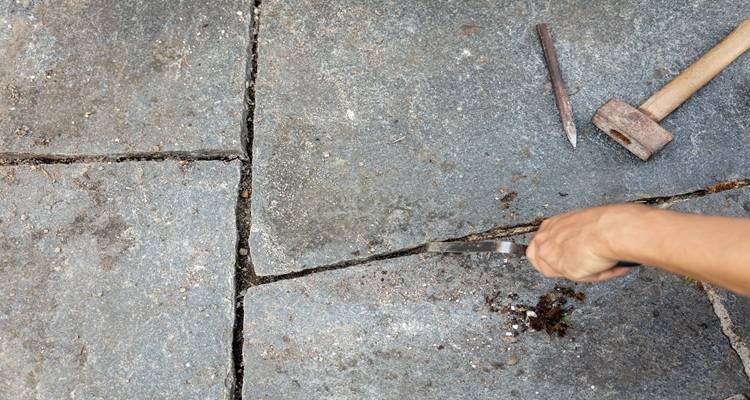
To ensure the longevity of your patio repointing, you’ll want to ensure the preparation has been completed successfully. If you’ve only partly removed the old mortar, have uneven gaps between patio slabs, and have weeds growing through gaps, adding a new pointing mix won’t fix the problem–it’ll just create a more expensive mess to fix in a few months.
Proper preparation is necessary for a successful repointing job. If you want to trim down your project’s costs, you can take on some of these preparation tasks yourself, such as clearing weeds and other plants from the area and chiselling out old mortar.
If you want to do some of the prep work yourself, you’ll need the following supplies:
- Chisel to remove old mortar, using a hammer and bolster to loosen stubborn areas - £30 for a kit
- Stiff-bristled brush to sweep away the debris from the area - £3.99
- Hosepipe/water supply - £11.95
Manual removal is usually sufficient in most patio environments, but mechanical removal may be necessary for patios with years of built-up pointing material. In these instances, it’s best to leave the removal to the professionals to save yourself from hiring cumbersome machinery to do the job.
Mechanical removal is far quicker than manual removal but also far harsher than the manual option. If carried out clumsily, this can damage surrounding patio slabs and block pavers, which will only add to your project’s costs if you need to replace slabs simultaneously with your pointing material.
FAQs
What Is Repointing?
Can I Repoint a Patio Myself?
- Patio pointing mix
- Chisel to remove old mortar, using a hammer and bolster to loosen stubborn areas
- Stiff-bristled brush to sweep away the debris from the area
- Pointing trowel to apply new mortar
- Hosepipe/water supply
How Often Does a Patio Need Repointing?
What Is the Best Material for Patio Pointing?
What’s the Purpose of Repointing a Patio?
Sources
https://www.diy.com/ideas-advice/how-to-repair-paving/CC_npci_100141.art



